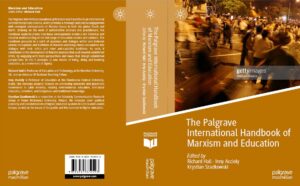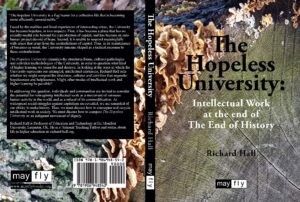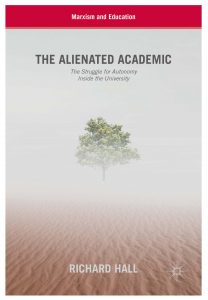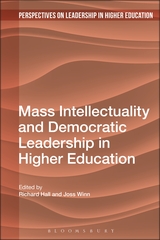Richard Hall (forthcoming). Beyond University Abolition: Imagining New Horizons for Intellectual Work with Mike Neary. Leicester. MayFly Books.
Overview
Beyond University Abolition (BUA) situates the work of UK educator, activist and scholar, Professor Mike Neary, against the traditions of indigenous, decolonial and abolitionist studies, in order to describe what lies at the horizon of University abolition, and what its transcendence might mean. Crucial in this analysis is an understanding of the contradictions between Neary’s revolutionary thinking and the intersectional, intercommunal and intergenerational realities of abolition. This has both theoretical and practical applications, and in the relationship between the concrete and the abstract, BUA will centre the idea of sublation, as an unfolding process of negating, abolishing and transcending. This brings our attention on the capitalist University into an engagement with a range of struggles that seek to transcend alienating social relations.
Beyond University Abolition is the third in a triptych that began with an analysis of academic labour in universities of the global North, in The Alienated Academic (2018, Palgrave Macmillan). In The Hopeless University (2021, Mayfly Press), the analysis moved on to critique the political economy of those institutions. The approach in BUA will build from those analyses, to imagine intellectual activity otherwise, within a society that must negate, abolish and transcend its settler-colonial and racial-patriarchal, capitalist institutions.
The geography for Neary’s work on HE was ostensibly centred in the UK following the financial crash of 2007. BAU’s approach will bring this context into dialogue with four transnational themes.
- The 2010/11 struggles of students/intellectual workers in the UK, framed by the autonomist Marxist ontology of In-Against-Beyond. This highlights the material history of the Commons/co-operative praxis post-2010, in order to understand its limits in HE.
- Neary’s critical sociology, and practical experiments developed in common, at the intersection of: critical political economy of the University (new reading of Marx); pedagogical analyses of student-as-producer (following the Frankfurt School); revolutionary and avant-garde teaching; and, the co-operative governance of higher education.
- The humanism of Marx’s political economy, and in particular his philosophical and ethnographical work, centred around human becoming-in-community, as a process of sublation. This is enriched through the relational accountability of indigenous and decolonial practices, which centre respect for axiology, cosmology, ancestry, land, communities and values, and ask us to imagine the world otherwise.
- This communal and co-operative critique will be placed in dialogue with abolitionist praxis, in order to understand how abolitionist university studies might contribute to the generation of a new horizon for society. Wilson-Gilmore’s abolition geography points towards the liberation of space-time, realised beyond settler-colonial and racial-patriarchal institutions. This highlights the deep interconnections between institutions and social structures, like prisons, schools, universities, families, borders, and so on. Thus, abolitionist praxis offers a way of considering intellectual work beyond the alienating structures, cultures and practices of these disciplinary networks of institutions and disciplines.
This prioritises a methodology of critique, through a close reading that integrates Neary’s work with a range of abolitionist studies and practices, alongside decolonial and anti-colonial being and doing. This methodology seeks to use Neary’s work as a departure point for tracing the horizon of a society which no longer needs the University, or in which the University has been transcended through a process of sublation.
Richard Hall, Inny Accioly and Krystain Szadkowski (2023). The Palgrave International Handbook of Marxism and Education. London: Palgrave Macmillan.
This was published in November 2023. There is an overview here: Weaving other worlds with, against and beyond Marx.
in November 2023. There is an overview here: Weaving other worlds with, against and beyond Marx.
Our original overview is here.
The book’s webpage is here.
Endorsements
This handbook represents urgent and necessary work. The struggles of the workers and the oppressed for the socialization of knowledge, their commitment to the emancipation of humanity, and the recomposition of socio-metabolism, all pulsate in education, and are central to the arguments presented here. Such struggles through education are the constant target of the dominant classes, aiming to profit from selling education as a commodity, capturing public resources, and, sadly, relegating education to mere labor force training, and as a result, we need the critical and active orientations discussed in the handbook.
Virgínia Fontes, Professor at the Fluminense Federal University and at the Florestan Fernandes National School of the Landless Workers’ Movement (MST), in Brazil.
This collection brings together an impressive array of intellectuals who adroitly demonstrate the enduring relevance of various Marxist modes of analysis for exploring and interrogating our contemporary world, the ongoing destruction wrought by capitalism across the globe and the ways in which extant educational structures, cultures and practices reinforce those destructive tendencies.
The editors’ comprehensive introduction along with 29 newly commissioned pieces by leading education scholars working theoretically and practically with and through Marx and in dialogue with decolonial, indigenous, queer, feminist and anti-racist perspectives offer fresh and unique insights that traverse arbitrarily established conceptual boundaries.
This handbook will be an invaluable resource for educators, students, activists and all those committed to envisioning a social horizon beyond the alienating and exploitative nature of capitalist social organization and radically rethinking the role that liberatory pedagogy may play in achieving that goal.
Dr. Valerie Scatamburlo-D’Annibale (she/her), Associate Professor, Department of Communication, Media and Film, University of Windsor
At a time when critical and creative thinking is under attack as never before–whether by neoliberalism, the far Right, and artificial “intelligence” devices that substitute for independent thought—this volume’s emphasis on how capitalism’s valorization process is undermining education could not be more timely. It is one of the most comprehensive, engaging, and in-depth analyses of the challenges facing critical pedagogy that have ever appeared.
Peter Hudis, Professor of Humanities and Philosophy at Oakton Community College.
This Handbook in Marxism and Education aims to ‘recalibrate’ the conversation between Marxism and Education by renewing as many dialogues as possible from multiple critical standpoints. Each of the entries of this remarkable volume, written by authors from all over the world, offers a theoretical, explanatory, or empirical angle to this conversation, be it class, race, gender, queer, ideology, theology, ecology, or labour. The ‘dialogues in Marxism and education are increasingly relevant for describing alternative conceptualizations of life’ write the handbook’s editors. They gathered contributors who pushed concepts and methods beyond established demarcations to be part of the wave of radical grassroots experiments against and beyond capitalism. The vital question for Marxism and Education today is how to learn and educate hope radically. This Handbook provides a guide in this direction.
Ana Cecilia Dinerstein, Reader in Sociology, University of Bath
 Richard Hall (2021). The Hopeless University: Intellectual Work at the end of The End of History. Leicester: MayFly Books.
Richard Hall (2021). The Hopeless University: Intellectual Work at the end of The End of History. Leicester: MayFly Books.
The book is available open access here.
There is a synopsis here.
There is a podcast here.
There is a published article here.
There is music by Rae Elbow and the Magic Beans, here.
Endorsements
In defining his position as a Marxist, Raymond Williams wrote that the most formidable task of all is to show the connections between “the formations of feeling and relationship which are our immediate resources in any struggle”. In Hopeless University Richard Hall takes up this task seriously. He helps us to understand how the current “university-as-is” relies on the universalization of anxiety and the spread of alienation. They are means through which it sustains its reign during the very last of its days, literally, at the end of the End of History. Moving from hopeless hierarchies, elitists privileges, widespread pathologies of the capitalist academic workplaces to ineffective positivist methodologies that lay at the core of the contemporary university, Hall criticizes the widespread culture of self-harm, imposed precarity, senseless competition, to address the contradictory essence of the hopeless institutions. We are dwelling in this contradiction. It makes our days unbearable; it makes us dire and dull; it prevents us from breaking the vicious circle of hope and despair. However, we know all too well that hope is no plan for liberation from this condition. Hall suggests that to escape it, we need to find the strength in what we have and who we are – in our daily practices of solidarity and mutuality, in our acts of self-care and kindness. By these means, we can finally face the call to starting the exodus from the tight walls of our “sausage factories”. The Hopeless University is the first and necessary step on this long path.
Krystian Szadkowski, Institute of Philosophy, Adam Mickiewicz University, Poznań, Poland.
In The Hopeless University Richard Hall builds on his previous book The Alienated Academic as he argues against the University in its current form. While already exploring hopelessness and the corresponding Weltschmerz academics feel towards their place of work in his previous works, he delves deeper into the idea of refusing what the University has become; an anxiety machine responsible for its workers’ ill-health, PhD students’ anxiety and depression and even academics’ and students’ suicides, for the sake of producing labour power and capital. Not only does the book reflect on the circumstances of those involved, it also situates the University within the socio-economic and socio-environmental crises that are currently taking place on a global scale. In doing so, Hall includes a critique of the University’s response to events such as the Black Lives Matter movement or the Covid-19 pandemic, highlighting its incompetence to offer solutions and position itself as anything but an anti-human project that puts profit before people. Casual workers have become more casualised, those with caring responsibilities are left to carry the burden, and work life further intrudes into private life through increased workloads that are to be done from home, resulting in a constant connection to the institution. Hall reiterates the non-neutrality of the University and its complicity in the reproduction of inequality and inequity, as those in precarious position are further exploited when they are gendered, racialised, disabled and/or queer. Thus, he does not treat these groups as an afterthought, despite him not facing the same challenges, making this book a good reminder for those who occupy “safe” positions within the academy to remember their privileges and continue to challenge their institutions on behalf of those who might not have the same degree of freedom. Towards the end of the book, Hall calls for the abolition of the University as we know it, for steps to be taken that are impossible in the hopeless institutions that currently exist. His critical analysis throughout the book leads Hall to conclude that only when the forces and relations of production are dismantled, another University, one that fosters community and promotes solidarity not just within the elitist walls of the institutions but also outside by joining working class organisation, can be possible, if at all.
Svenja Helmes, PhD student at the University of Sheffield and co-author of Life for the Academic in the Neoliberal University.
At the end of The End of History, we urgently need brave voices to tell us that, no matter how fervently we might hope, we must confront the stark truth that everything may well not turn out all right; to confront ourselves in and of this truth; and to begin the necessary process of grieving this truth. Richard’s forensic deconstruction of the capitalist university, and the senses of hopelessness and helplessness it generates, leaves us unable to deny this truth any longer. Yet, it is Richard’s unflinching commitment to a dialectical materialism that enables him to reveal how the transformative power of truth takes seed when we finally and fully allow it into our hearts. It is in this heart-centred dialogical process of reintegration within and reconnection without that he locates not just the healing power of sharing our stories, but the first stirrings of a movement. It is a movement of negation of the Hopeless University’s own negation of our difference and denial of our being; a movement of the deepest, most essential yearning for our personal and collective authentic becoming; and, therefore, a movement with the capacity to imagine, explore, and organically establish modes, cultures, and even institutional forms of knowing that can birth a new system of social metabolism beyond capital’s tyrannical reign.
Each page of this wonderful book is filled with vulnerability, courage, wisdom, and, above all, love. Richard combines all four of these qualities in his refusal to offer any strategic blueprint for an alternative post-capitalist university and in his invitation to us to sit – to sit with ourselves and with each other, with our wounds and our pain, to sit with the bewildering but beautiful entangled messiness of our lives and our world, and to sit attentive at last to a present that can integrate and be fertilised by a past in order to conceive a new dawn yearning to be born.
Joel Lazarus, University of Bath.
Richard Hall (2018). The Alienated Academic: The Struggle for Autonomy Inside the University. London: Palgrave Macmillan.
Higher education is increasingly unable to engage usefully with global emergencies, as its functions are repurposed for value. Discourses of entrepreneurship, impact and excellence, realised through competition and the market, mean that academics and students are increasingly alienated from themselves and their work. This book applies Marx’s concept of alienation to the realities of academic life in the Global North, in order to explore how the idea of public education is subsumed under the law of value. In a landscape of increased commodification of higher education, the book explores the relationship between alienation and crisis, before analysing how academic knowledge, work, identity and life are themselves alienated. Finally, it argues that through indignant struggle, another world is possible, grounded in alternative forms of organising life and producing socially-useful knowledge, ultimately requiring the abolition of academic labour. This pioneering work will be of interest and value to all those working in the higher education sector, as well as those concerned with the rise of neoliberalism and marketization within universities.
There is a book review by Joss Winn here.
There is a book review by Svenja Helmes here.
There is a book review by Fergal Finnegan here.
There is a two-part podcast of the book launch: part one is here; part two is here.

